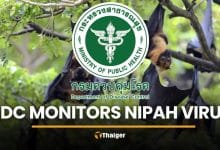Experts say Omicron variant infections widely underreported

While the Omicron variant is now estimated to account for about 30% of all new Covid-19 infections in Thailand, experts believe that the actual number of cases of the strain is massively underreported. Dr Yong Poovorawan, the chief of the Centre of Excellence in Clinical Virology at the Faculty of Medicine of Chulalongkorn University, says that the more intensive testing to identify not just a Covid-19 infection but the Omicron variant itself is not being done frequently enough to identify Covid-19 infections are the Omicron variant.
Dr Yong believes this to be the case in Thailand but also in many countries around the world, saying that the true number of Omicron variant infections is likely much higher than what has been reported globally. The problem is, while we have multiple testing methods available widely to detect a Covid-19 infection, identifying the Omicron strain requires genome analysis tests to be sure of the strain.
“We must admit that the Omicron variant has been spreading in Thailand and other countries around the world.”
Using the S gene testing genome analysis would identify the Omicron infections but it is time and resource consuming and not part of Thailand’s standard testing procedure. So while 3,000 Omicron variant infections are being reported, there is likely a much higher number that have yet to be detected.
Right now, Thailand can only test samples for Omicron in Bangkok and nearby provinces, but Dr Yong predicts that 30% of infections across the country are now of the highly contagious strain. The Department of Disease Control says Delta is still the dominant variant in Thailand, estimating 70% to 80% of all current infections are Delta.
On the bright side, Omicron is proving to be a weaker strain despite being more transmissible, so severe symptoms and death rates are lower.
SOURCE: The Phuket News
Latest Thailand News
Follow The Thaiger on Google News:


























